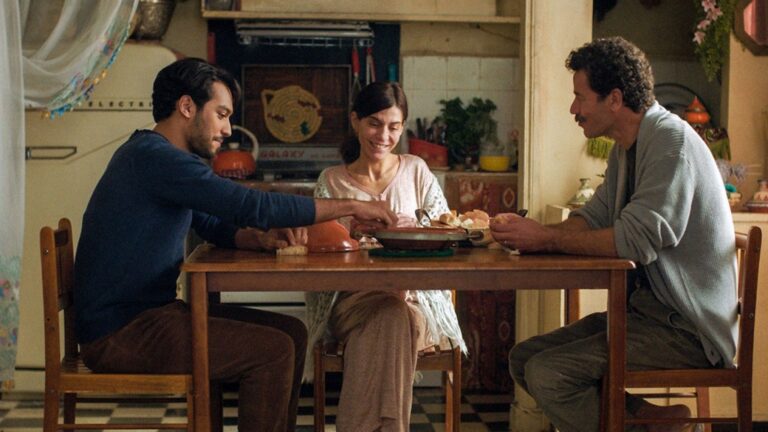Movie Info
Movie Info
- Director
- Maryam Touzani
- Run Time
- 2 hours and 2 minutes
- Rating
- Not Rated
VP Content Ratings
- Violence
- 0/10
- Language
- 1/10
- Sex & Nudity
- 4/10
- Star Rating
Relevant Quotes
For now we see only a reflection, as in a mirror, but then we will see face to face. Now I know only in part; then I will know fully, even as I have been fully known. And now faith, hope, and love remain, these three, and the greatest of these is love.
1 Corinthians 13:12-13

Moroccan writer-director Maryam Touzani handles as difficult a question for Muslims in his new film as it is for Christians—the love between members of the same sex that their culture condemns. Her unusual tale is as sensitive and tender as any romance film, and far more challenging. And it climaxes with an act of love that involves much sacrifice, while honoring one’s beloved.
In the northwestern Moroccan city of Salé, Halim (Saleh Bakri) runs a high-end tailor shop with the assistance of his wife. Mina (Luna Azabal). He is skillful at his trade, having learned it from his father. Customers flock to his shop to order fancy caftans for weddings and other high occasions. We see his skill as he progresses in sewing an exquisite blue caftan—petroleum blue he corrects a mistaken customer. Later, he explains to another customer that she must not have just any old material, but cloth that flows unhindered over the body’s contours.
Mina becomes ill, which causes Halim to fall behind in his schedule. Customers start complaining, among them the arrogant wife of a local official. She is impatient for him to finish the beautiful blue caftan she has ordered. He resists her suggestion that he use a machine to finish the garment, rather than hand sew it. That would go against the tradition of a craft of which he is proud and respectful. Thus Halim has hired Youssef (Ayoub Messioui) to be his apprentice.
Halim regularly visits the public baths where he seeks more than a clean and refreshed body. He loves Mina—there are many touching shots of the two laughing and conversing affectionately—but, we surmise when at the hammam (bath house) he accompanies another man into a private booth—that he has additional sexual urges. Halim is a closeted gay man. Soon Mina seems to sense that there is something between her husband and their young apprentice, so she resents the newcomer. She even accuses him of stealing some missing cloth. Halim believes the man’s sincere protestations and keeps him on despite his wife’s suspicion. Youssef is eager to learn the art of sewing, striving to please his master. Halim tells him. “A caftan must be able to survive the one who wears it. Pass from mother to daughter. Resist time.”
Then Mina develops an illness. She bravely tries to carry on at the shop, but falls to ill that she has to take to her bed. Halim now runs the shop alone because when he and Youssef have a falling out, the young man quits. As her illness progresses and Mina needs more care, Halim closes the shop so he can tend to her full time. He continues working on the embroidery of the gorgeous blue caftan.
One day there is a knock at his door. It is Youssef, concerned after showing up at the shop and discovering it closed. Learning about Mina’s illness, all is forgiven between the young and older man, the latter returning to run the shop for his master. He is soon dining with the couple, Mina’s hostility melting away. There is a powerful moment of reconciliation between her and the man she had accused of being a thief.
The couple and the young man become a threesome, their love expanding beyond gender boundaries. And when the stricken woman passes Halim shows his love and respect for his wife in the most expressive way possible. That scene, though filled with sorrow, is actually a beautifully triumphant one. The climax is one that I predict will stay with you long after lesser films are forgotten. Without the usual graphic sexual scenes, Maryam Touzani explores a love that crosses gender boundaries. It is a love as her characters depict it very much akin to the agape love described by the apostle Paul in what has been called his Great Hymn to Love.
Had I seen this Oscar contender last year, it would have been among VP’s Top Ten Films of 2022!
This review will be in the May issue of VP along with a set of questions for reflection and/or discussion. If you have found reviews on this site helpful, please consider purchasing a subscription or individual issue in The Store.

